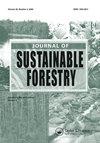Climate Change Adaptation in Non-Timber Forest Products: How Resilient are Small Shiitake Producers?
IF 1.8
4区 农林科学
Q3 FORESTRY
引用次数: 1
Abstract
ABSTRACT This study focused on shiitake mushrooms as non-timber forestry products adapting to climate change in an area to examine the practice of sustainable forest management. Our study is relevant to Globally Important Agricultural Heritage Systems because the research site is located in Kunisaki Peninsula in Japan, which is conventionally prone to drought. We examined how producers have been coping with climate change by adopting low- and middle-temperature varieties of shiitake, Lentinula edodes. This survey collected qualitative and quantitative data at the field level. Qualitative data were derived from interviews with shiitake producers, cooperative staff members, government officials, and a wholesaler followed by a quantitative survey. Moreover, a workshop was organized to verify the results of the interviews. The study results indicate that producers with a higher-than-average ratio of low-temperature shiitake production tend to sell through a brand for low-temperature shiitake varieties and acquire production knowledge from a parent. Annual sales and sloping terrain also affected the ratio. Furthermore, ongoing challenges presented by climate change can alter information and knowledge exchange, which thus increases interaction beyond family members.非木材林产品对气候变化的适应:小型香菇生产者的复原力如何?
摘要本研究的重点是香菇作为一个地区适应气候变化的非木材林业产品,以检验可持续森林管理的实践。我们的研究与全球重要农业遗产系统有关,因为该研究地点位于日本国崎半岛,该半岛通常容易发生干旱。我们研究了生产商如何通过采用中低温度的香菇和香菇品种来应对气候变化。这项调查收集了实地一级的定性和定量数据。定性数据来源于对香菇生产商、合作社工作人员、政府官员和批发商的采访,然后进行定量调查。此外,还组织了一次讲习班,以核实访谈结果。研究结果表明,低温香菇生产比例高于平均水平的生产商倾向于通过低温香菇品种的品牌进行销售,并从父母那里获得生产知识。年销售额和斜坡地形也影响了这一比例。此外,气候变化带来的持续挑战可能会改变信息和知识交流,从而增加家庭成员之外的互动。
本文章由计算机程序翻译,如有差异,请以英文原文为准。
求助全文
约1分钟内获得全文
求助全文
来源期刊

Journal of Sustainable Forestry
Social Sciences-Geography, Planning and Development
CiteScore
3.90
自引率
12.50%
发文量
42
期刊介绍:
Journal of Sustainable Forestry publishes peer-reviewed, original research on forest science. While the emphasis is on sustainable use of forest products and services, the journal covers a wide range of topics from the underlying biology and ecology of forests to the social, economic and policy aspects of forestry. Short communications and review papers that provide a clear theoretical, conceptual or methodological contribution to the existing literature are also included in the journal.
Common topics covered in the Journal of Sustainable Forestry include:
• Ecology, management, recreation, restoration and silvicultural systems of all forest types, including urban forests
• All aspects of forest biology, including ecophysiology, entomology, pathology, genetics, tree breeding, and biotechnology
• Wood properties, forest biomass, bioenergy, and carbon sequestration
• Simulation modeling, inventory, quantitative methods, and remote sensing
• Environmental pollution, fire and climate change impacts, and adaptation and mitigation in forests
• Forest engineering, economics, human dimensions, natural resource policy, and planning
Journal of Sustainable Forestry provides an international forum for dialogue between research scientists, forest managers, economists and policy and decision makers who share the common vision of the sustainable use of natural resources.
 求助内容:
求助内容: 应助结果提醒方式:
应助结果提醒方式:


